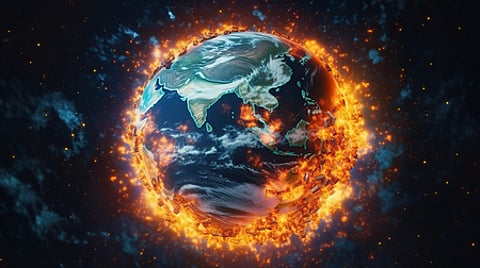Earth Day 2025: A planet in peril, a call to action
Earth Day, first established in 1970, has by now evolved into a global environmental movement that aims to inspire collective action to safeguard the planet. This year’s theme, “Our Power, Our Planet,” emphasises the importance of harnessing the collective strength of individuals, communities, and governments to take meaningful action for environmental protection and restoration.
But, despite five decades of awareness campaigns and environmental initiatives, the Earth is sounding a loud alarm:
Global Warming: Average global temperatures have continued to rise, driven largely by greenhouse gas emissions from burning fossil fuels.
Extreme Weather Events: Increased frequency and severity of hurricanes, floods, wildfires, droughts, and heatwaves are displacing populations and destroying ecosystems.
Oceans in Trouble: Plastic pollution, coral bleaching due to warming waters, overfishing, and acidification are threatening marine life and coastal communities.
Biodiversity Collapse: Species extinction rates are now 1,000 times higher than the natural background rate, driven by habitat destruction, pollution, and climate change.
Resource Depletion: Freshwater scarcity, soil degradation, and deforestation are intensifying, undermining food and water security.
Air Pollution: In many regions, poor air quality continues to be a silent killer, contributing to millions of deaths annually.
Environmental Inequity: Vulnerable populations—especially in the Global South—are disproportionately affected by environmental degradation, linking the ecological crisis directly to human rights.
Awareness vs. Action
Environmental consciousness has certainly grown. Children are learning about sustainability in schools, people participate in clean-up drives, and social media amplifies eco-friendly messages. Yet:
Policy and Implementation Lag: Many international agreements, such as the Paris Accord, suffer from slow adoption and weak enforcement.
Short-Term Vision: Policymakers often prioritize economic growth over long-term environmental stewardship.
Lifestyle Inertia: While people may care about the planet, shifting consumption habits and reducing carbon footprints remain difficult without systemic change.
The Path Forward: Systemic Change and Collective Will
To confront the environmental crisis head-on, we must adopt a multi-level, sustained approach:
a. Transition to Clean Energy
Phase out fossil fuels in favor of solar, wind, hydro, and other renewables.
Promote decentralized energy systems in underserved regions.
b. Sustainable Agriculture & Food Systems
Encourage regenerative farming, plant-based diets, and reduced food waste. Support small farmers and indigenous agricultural knowledge.
c. Urban Redesign
Build green cities with efficient public transport, green spaces, and sustainable infrastructure. Incentivise eco-friendly construction and retrofitting.
d. Circular Economy & Innovation
Reduce waste through recycling, upcycling, and reusing materials.
Foster innovation in clean technology and nature-based solutions.
e. Policy and Legal Reform
Enforce stronger environmental regulations.
Recognize ecocide and hold polluters accountable.
f. Education and Advocacy
Integrate environmental education at all levels.
Empower youth-led climate movements and indigenous voices.
g. Climate Finance
Ensure equitable climate funding for vulnerable nations and communities.
Invest in green jobs and resilient infrastructure.
Mobilizing for a Sustainable Future
Earth Day serves as both a celebration and a catalyst for change. It must now evolve into a continuous platform for coordinated, cross-sectoral action. From grassroots movements to intergovernmental efforts, from scientific innovation to personal lifestyle changes—every action counts.
However, signs of hope are emerging. Youth climate activists are pushing boundaries and clean technologies are rapidly improving and becoming cheaper.
Nature-based solutions like reforestation and wetland restoration are gaining ground. But hope without action is not enough. The urgency of the climate and ecological crises demands bold policies, transformative change, and a long-term commitment to healing the planet.
A Final Wake-Up Call
Earth is not just our home; it is our only home. As we reflect on Earth Day 2025, it is no longer enough to acknowledge the problem—we must be the solution. The time to act is now.

